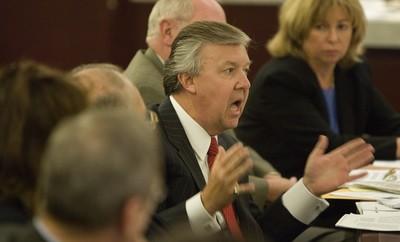Panel opens debate over sealing of records

Sixteen people shoot down a new slide at a local water park, and all of them break their right clavicles.
Should their personal injury settlements be open to public scrutiny?
A surgeon with a history of settling cases that allege malpractice asks a judge to seal his court records.
Should the courts protect his privacy or keep the records open so that prospective patients have a way to discover the surgeon’s history?
For the next 90 to 180 days, members of the Nevada Supreme Court’s newly formed Commission on the Preservation, Access and Sealing of Court Records will explore such questions as they shape recommendations that will define when it is proper to cut off public access to civil and criminal cases and when it is not.
On Monday, as the group met for the first time, Nevada Supreme Court Justice James Hardesty asked the commission to consider three questions:
• Should super-sealing, which removes all traces of a case from the public record, be off-limits in Nevada?
• Does the burden of proof to seal records rest on the person seeking to seal a case?
• Before a case is sealed, should a hearing be held before a judge to determine whether the state or any other entity has a compelling interest in the matter?
None of the commission members who spoke supported the idea of super-sealing cases, a practice that several individuals seemed unfamiliar with, including Hardesty and Washoe County District Judge Brent Adams.
Both were taken aback when attorney Pat Lundvall told them she has been in the middle of a super-sealed case since 1998. No record of it exists in Blackstone, the Clark County District Court’s electronic case-tracking system. The hearings are not noticed. The courtroom is cleared by the bailiff when hearings take place.
At the same time, the federal side of the case is a matter of public record.
"That’s an example for you of how super-sealing works," said Lundvall, who is with the firm of McDonald, Carano and Wilson.
Adams said during the hearing that super-sealing is not a practice he endorses and should not be the rule in Nevada.
"I would suggest, for many reasons, that kind of conduct should be off-limits," Adams said.
Las Vegas Attorney Don Campbell, whose clients have included the Review-Journal, made an argument for transparency.
Situations do occur when court records should be sealed, Campbell said. Publicizing the issue of search warrants endangers law enforcement officers and gives suspects the opportunity to flee or destroy evidence.
But secrecy should be the exception, not the rule, Campbell said. And in cases in which litigants ask for summary judgment — a ruling in their favor that would preclude a trial — secrecy should not even be an expectation.
"If you are asking for summary judgment, you are calling upon the court to make a public decision," Campbell said. "And you cannot have the courts making public decisions based on secret acts."
The issue of sealed court cases was the topic of a Review-Journal series published in February. It found that at least 115 lawsuits had been sealed by Clark County District Court judges between 2000 and 2006.
A bill that would have required more openness in court records failed in the Legislature on Thursday, with lawmakers noting that the situation would be handled more properly by the Supreme Court commission.
The commission includes attorneys, judges and representatives of the media. Review-Journal Special Projects Editor A.D. Hopkins serves on the commission. The group will meet again in June.